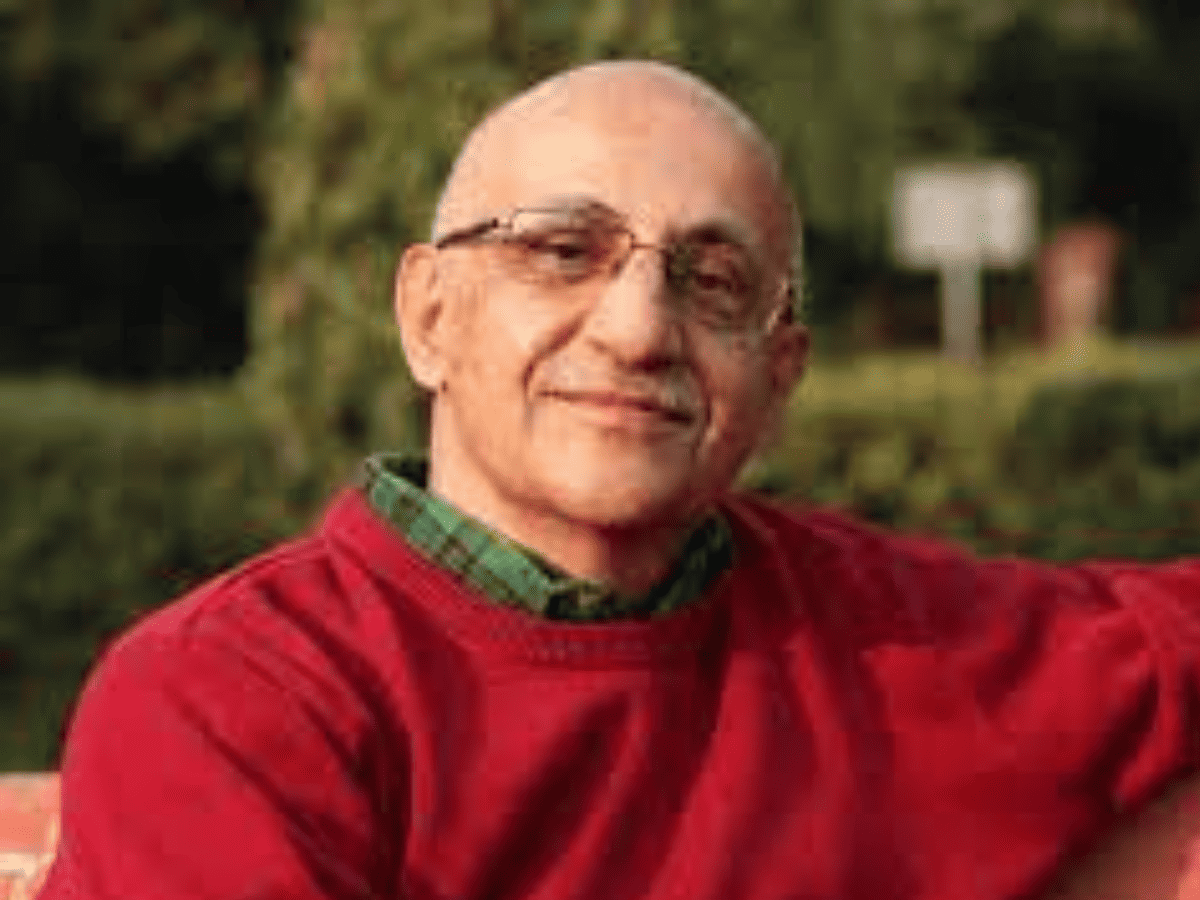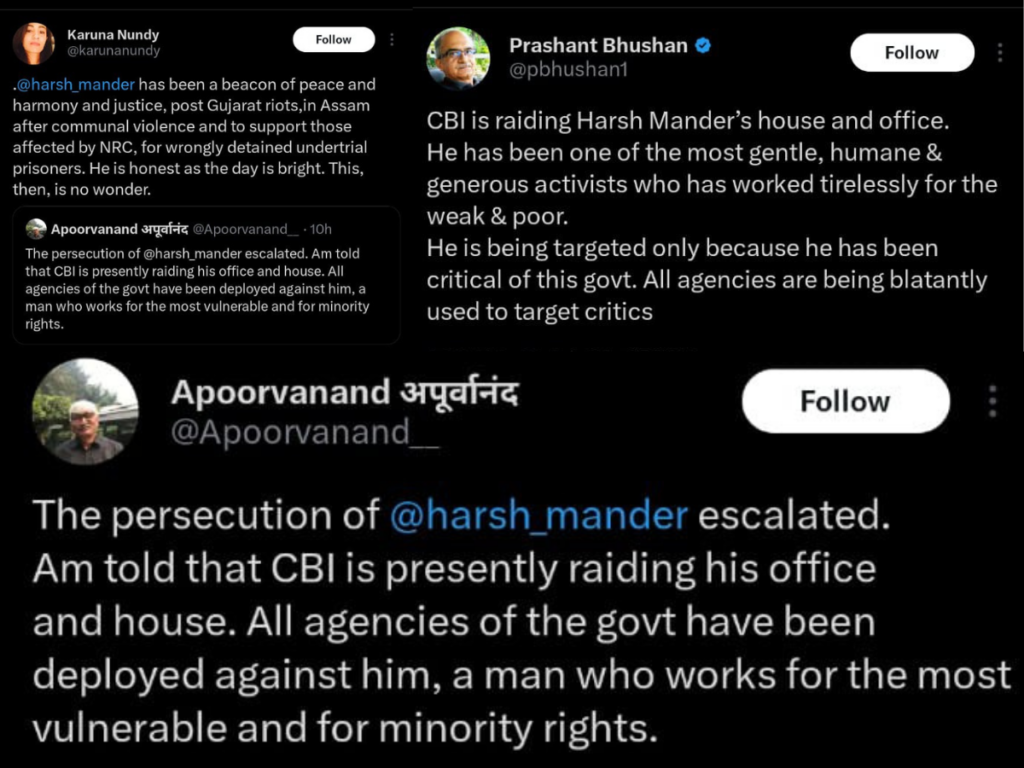
The Central Bureau of Investigation (CBI) on Friday raided the residence and office of former Indian Administrative Services (IAS) officer and activist Harsh Mander in Delhi following a probe into alleged violation of foreign contribution regulations by his NGO, Centre for Equity Studies.
The FIR against the NGO was registered following a complaint by the Union Home Ministry, which was prompted by an inspection conducted by the National Commission for Protection of Child Rights (NCPCR).
The CBI investigated Mander’s study, library, and cabinets at home in search of documents. “A few insignificant documents were taken away by them. But they did not confiscate or examine digital gadgets,” the source told News Laundry, stressing how “courteous” the CBI team was.
Two Punjab National Bank employees served as ‘witnesses’ for each CBI team since CES’s non-FCRA bank account is with them.
The raids sparked discussion on social media: “Harsh Mander has dedicated his life to promoting social justice and speaking out against the violations of marginalised and minority community’s human rights. Though it is pursuing him, the totalitarian government will not be able to silence criticism like this,” a netizen posted on micro-blogging site X.
Lawyers and activists spoke up with the citizens and denounced the CBI and the government’s actions. Columnist and Delhi University professor Apoorvanand criticised Mander’s “persecution,” characterising him as a “man who works for the most vulnerable and for minority rights.”

Recently promoted to senior advocate, Supreme Court attorney Karuna Nundy called Mander a “beacon of peace, harmony, and justice.” Prashant Bhushan, an attorney for the Supreme Court, claimed on X that the activist was being targeted because he was “critical of this government.”
Allegations against Mander
Mander has been a fierce opponent of the policies of the Narendra Modi administration. In addition to writing frequently for Scroll, The Hindu, The Indian Express, and The Wire, he is the author of more than a dozen books.
In an effort to “influence public policy and law in favour of people of greatest disadvantage,” Mander co-founded CES in 2001. Mander is a member of the governing board as well as a trustee.
The Ministry of Home Affairs originally temporarily revoked CES’s FCRA license in June 2023, a decision that lasted 180 days. In December, the suspension was extended for an additional 180 days. One of the stated reasons for the suspension was that Mander reportedly received CES’s FCRA funds in exchange for drafting media columns.
Mander was accused of accepting Rs 12.64 lakh as “receipts or payments” from CES’s FCRA account between 2011–12 and 2017–18, according to an MHA notification sent to the “chief functionary” at CES on December 11 of last year.
According to the notice, Section 3 of the FCRA “prohibits correspondents, columnists, cartoonists, editors, owners, printers, and publishers of a registered newspaper from accepting foreign contributions” since doing so could “prejudicially” harm India’s “sovereignty and integrity.”
Additionally, the ministry charged that Mander and CES had exploited CES’s FCRA account to pay co-authors of media columns. For instance, it referenced this August 6, 2018, story from Scroll that was co-written by Mander, Anjali Bhardwaj, and Amrita Johri.
The notice claimed that sections 3 and 8 of the FCRA as well as the requirements of registration under section 12(4)(a) were violated by Johri and Bhardwaj, who were paid “Rs 1,13,251 and Rs 25,64,550 from the FCRA account of the association,” respectively, 12(vi).
Other cases
“The government has set all agencies against him and organisations linked to him,” another source stated to Newslaundry. Three years ago, the ED raided his home and workplace. The CBI is now the government’s go-to source.
Based on a Delhi police FIR, the ED raided Mander’s home and workplace in 2021 in relation to a “money laundering” probe. Two complaints had been filed by the police, one for alleged financial irregularities and the other under the Juvenile Justice Act.
The National Commission for Protection of Child Rights allegedly raided two child care facilities in 2020 because they were suspected of having “financial irregularities” and of “sending” kids to anti-CAA demonstration locations.
Furthermore, the Delhi police said in their chargesheet in the conspiracy case pertaining to the Delhi riots that Mander “provoked violence” during a speech at Jamia Millia Islamia.
Who is Harsh Mandar?
Harsh Mander is an Indian writer, researcher, educator, and social activist. He started the Karwan-e-Mohabbat movement to aid those who had been harmed due to religious persecution. Mander, who was a Special Commissioner to the Indian Supreme Court in the Right to Food Campaign, is currently the director of the Center for Equity Studies.
He is a former Indian Administrative Services officer and served in Madhya Pradesh and Chhattisgarh for over twenty years. He left the service following the Gujarat riots and began his social activities. Mander is a member of the Working Group of the Project on Armed Conflict Resolution and People’s Rights and a founding member of the National Campaign for the People’s Right to Information.
Sonia Gandhi appointed him to the Indian National Advisory Council in 2010. He has received numerous honors, including the MA Thomas National Human Rights Award, the South Asian Minority Lawyers Harmony Award, the Chisthi Harmony Award, and the Rajiv Gandhi National Sadbhavana Award for peace work.
